annual report1-final.qxd - Overseas Indian
annual report1-final.qxd - Overseas Indian
annual report1-final.qxd - Overseas Indian
You also want an ePaper? Increase the reach of your titles
YUMPU automatically turns print PDFs into web optimized ePapers that Google loves.
Plenary Session 1<br />
S.Krishna Kumar, left, Secretary, Ministry of <strong>Overseas</strong> <strong>Indian</strong> Affairs, and Devesh Kapur, Professor, University of Texas, at the plenary session on<br />
‘Defining the Diaspora Agenda’ in Hyderabad on January 7, 2006.<br />
PLENARY SESSION I<br />
DEFINING A DIASPORA AGENDA<br />
Chair:<br />
Oscar Fernandes,<br />
MOS (IC)<br />
Opening Remarks: S. Krishna Kumar,<br />
Secretary, MOIA<br />
Speakers:<br />
Prof. Sunil Khilnani,<br />
Director, South Asia Studies,<br />
Johns Hopkins University<br />
Prof. Devesh Kapur,<br />
Professor, University of Texas<br />
Dato Seri S. Samy Vellu,<br />
Minister of Works, Malaysia<br />
Dr. Prem Misir,<br />
Pro-Chancellor,<br />
University of Guyana<br />
Lalit Mansingh,<br />
Former Foreign Secretary<br />
MOIA Secretary S. Krishna Kumar welcomed the<br />
gathering and stated that the <strong>Indian</strong> diaspora was<br />
heterogeneous; therefore, defining the diaspora<br />
agenda needed addressing the needs of disparate<br />
groups. The key to this would be to develop location<br />
specific agendas that would add up to an all<br />
inclusive diaspora agenda. He emphasised that the<br />
diaspora was India’s soft power and an agenda that<br />
helps build partnerships should be the focus.<br />
Prof. Sunil Khilnani, Johns Hopkins University,<br />
highlighted the need for branding India. India’s<br />
brainpower could be exported to the global economy.<br />
He mentioned that economic and military<br />
prowess were not enough to ensure security. The<br />
<strong>Indian</strong> state and society should be projected properly<br />
in the global market, he said and added that<br />
brand identity was associated with soft power to<br />
articulate India globally so that the weaknesses<br />
could be transformed into India’s strength. The<br />
diasporic community could be India’s brand<br />
ambassadors. The diaspora could help in developing<br />
its service sector, remove shortages of skilled<br />
labour and participate in developing its education<br />
reforms.<br />
Prof. Khilnani was of the view that India needed<br />
high quality of education along with diversity.<br />
Therefore, India has to become a producer rather<br />
than consumer of knowledge in a global society, he<br />
said. The new identity in the 21st century would be<br />
6



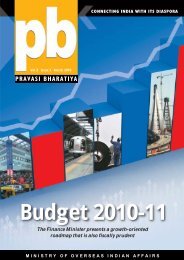
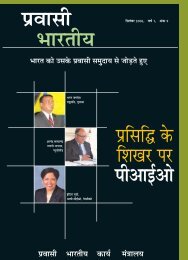

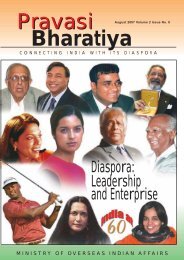
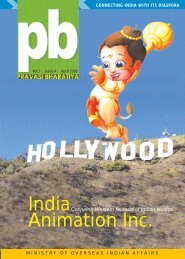
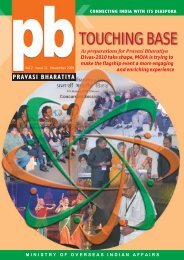
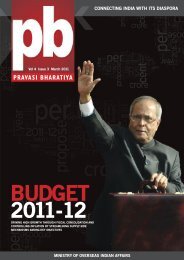
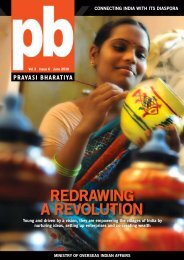
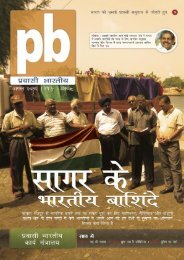

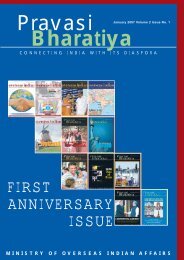
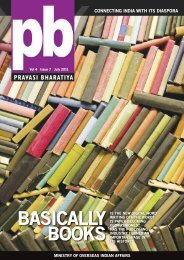
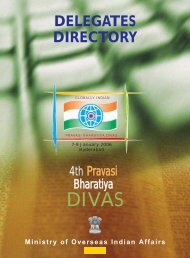
![flaxkiqj feuh izoklh Hkkjrh; fnol] vDVwcj 9&11 - Overseas Indian](https://img.yumpu.com/43977040/1/184x260/flaxkiqj-feuh-izoklh-hkkjrh-fnol-vdvwcj-911-overseas-indian.jpg?quality=85)
